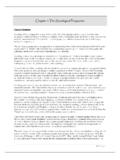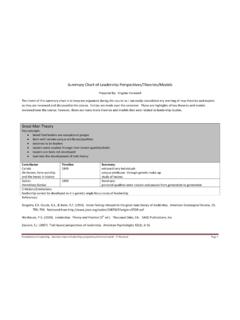Transcription of Sociological Paradigms and Organisational AIlalysis
1 SociologicalParadigmsandOrganisationalAI lalysisElementsoftheSocioloRYofCorporate L({eGibsonBUlT'H'eBmlecturerintheDepartm entofBehaviourinOrganisations,University oflancaster,EnglandGarethMorgalmAssociat eProfessorofOrganisationalBehaviourandIn dustrialRelations, :THEPARADIGMSEXPLORED~FunctiollllalistSo ciology<1nOriginsandIntellectualTraditio n4\TheStructureoftheParadigm48 SocialSystemTheory49 InteractionismandSocialActionTheory68 IntegrativeTheory87 Objectivism102 TheUnderlyingUnityoftheParadigm106:5 FIJlll1lctiomnRistOrglllrusllltiolllnlle orynn8 TheoriesofOrganisationwithintheFunctiona listParadigm121 SocialSystemTheoryandObjectivism123 TheoriesofBureaucraticDysfunctions184 PARTI:INSEARCHOfAFRAMEWORKnAssumptiOHlls lllbouttheNllltlUlreoa'SocialSciellllcen TheStrandsofDebate4 Analy' 'Regulation'and'RadicalChange'16 JTwoDimelllsioll1lS:]four!)}
2 Paradigms2llTheNatureandUsesoftheFourPar adigms23 TheFunctionalistParadigm25 TheInterpretiveParadigm28 TheRadicalHumanistParadigm32 TheRadicalStructuralistParadigm33 ExploringSocialTheory35 ,storedina retrievalsystem,ortransmittedinanyformor byanymeans,electronic,mechanical,photoco pying,recordingorotherwisewithouttheprio rpermissionofthepublisherFirstpublishedi n1979byHeinemannEducationalBooksReprinte d1980,1982 Reprinted1985,1987,1988byGowerPublishing CompanyLimitedReprinted1992byAshgatePubl ishingLimitedReprinted1993,1994byArenaRe printed1998,2000,200I,2003,2005byAshgate PublishingLimitedGowerHouseCronRoadAlder shotBantsGU11311 REnglandAshgalePublishingCompanySuile420 101 CherryStreelBurlington,VT05401-4405 USAIA shgatcwebsite: :ntaBurrell, , '5 HMl31 ISBN0566051486 Hbk1857421140 PbkPrintedandboundinGreatBritainbyAthena eumPressLtd,Gateshead,Tyne&WearContentsU stoffiguresListofTablesAcknowledgementsI ntroductionpagevvVIviiiIntroductionThisb oole,whichhasdevouredthelasttwoyearsofou rlives,istheproductofa 'wayofseeing'.
3 Ithaschangedthewaysinwhichwethinkaboutso cialtheory, fairlyspecificobjec- ,however, ,ofwhichthoseinthegeneralareaoforganisat ionstudies-industrialsociology,organ-isa tiontheory, ,forexample, ' ,asinothersocialsciencedisciplines,is thata vastIntroductionixproportionoftheoryandr esearchis ,thebulkofitislocatedwithinthecontextofa ,therefore, , ,however, , importantthata theoristbefullyawareoftheassumptionsupon whichhisownperspectiveis " ,theauthors, , ,wefeltthatoursubjectareacalledfora closee1taminationoftheassumptionsuponwhi chitisbasedwithaviewtoseeingit ina new,andhopefullyrefreshing, ( 'alltheoriesoforganisationarebasedupona philosophyofscienceanda theoryofsociety' ,itisclearthattheyalltakea ,theybringtotheirsubjectofstudya frameofreferencewhichreflectsawholeserie sofassumptionsaboutthenatureofthesocialw orldandthewayinwhichit ,andthatthesatelliteperspectiveswhichweh adobservedassurroundingtheorthodoxywere, infact, ; ,atfirst, 'order-conflictdebate'-whethersociologye mphasisesthe'problemoforder'orthe'proble mofconflictandchange'.)
4 Bythelate1960sthedebatehadbeenpronounced dead, wasclearthatacademicsociologistshadconvi ncedthemselvesthatthe'problemofconflict' couldbesubsumedunderthe'problemoforder', theoristsoutsidethistradition,particular lythoseinterestedinMarxisttheory, , ~ , ~tellectualdevelopmentswithinMandsttheor yandacademiCsoc~olog~. ,too,t~ ~tra-ditionstotheirsource,wefoundthatthe yemergedfromprec~ 'order'asopposedto'conflict' , ,..Giventhesecrosslinkagesbetweennvalmte llectualtraditions,itbecamecleartousthat ourtwosetsofassumptionscouldbecounter-po sedtoproduceananalyticalsch~meforstudyin gsoci~1 ~nedfo~ ~ ,andonewhichmadesenseofa ~schem~offereditselfasa ;theyusuallyhavea ~ , ~1theoryandorg~ ,whilstwehave'madeeveryefforltopresentou raccountasplainlyaspossibleasfarastheuse oftheEnglishlanguageisconcerned, ,emainingchaJ;> ~ , alltooeasybutself-defeating, todevelop theperspectivecharacteristicofftheparadi gmanddrawoutsomeofits' ~ssentiallyeJ\positoryi~ 'provide~ ~entsaslJ(~ :INSEARCHOFAFRAMEWORK10 AssumptionsabouttheNatureofSocialScience Centraltoourthesisis theideathat'alltheoriesoforganisationare basedupona philosophyofscienceanda theoryofsociety'.)
5 Is convenienttoconceptualisesocialsciencein termsoffoursetsofassumptionsrelatedtoont ology,epistemology, \plicitorimplicitassumptionsaboutthenatu reofthesocialworldandthewayinwhichit ,thereareassumptionsofanontologicalnatur e- ,foreJ\ample,arefacedwitha basicontologicalquestion:whetherthe'real ity'tobeinvestigatediseJ\ternaltotheindi vidual- imposingitselfonindividualconsciousnessf romwithout-ortheproductofindividualconsc iousness;whether'reality'isofan'objectiv e'nature,ortheproductofindividualcogniti on;whether'reality'is agiven'outthere'intheworld,ortheproducto fone' , ,foreJ\ample,aboutwhatformsofknowledgeca nbeobtained,andhowonecansortoutwhatistob eregardedas'true'fromwhatistoberegardeda s'false'.Indeed,thisdichotomyof'true'and 'false'itselfpre-supposesa predicateduponaviewofthenatureofknowledg eitself:whether,forexample,it ispossibletoidentifyandcommunicatethenat ureofknowledgeasbeinghard,realandcapable ofbeingtransmittedintangibleform,orwheth er'knowledge'isofa softer,moresubjective,spiritualoreventra nscendentalkind,basedoneJ\perienceandins ightofa!
6 Schemeforanalysingassumptionsaboutthenat ureofsocialscienceAssumptionsabouttheNat ureojSocialScience3socialworldasifitwere ahard,external, likelytofocusuponananalysisofrelation-sh ipsandregularitiesbetweenthevariouseleme ntswhichit ){ ~ ~ ~ isanapproachwhichemphasisestherelativist icnatureofthesocialworldtosuchanextentth atitmaybeperceivedas'anti-scientific' ~ ~ ~ssumptlOnsIntheseInstancesdetermineextr emepositionsontheIssueofwhetherknowledge issomethingwhichcanbeacquiredon~ ~ . ~ , ; ~ecanbecontrastedwithonewhichattributest ohumanb~i~gsam~chmorecreativerole:withap erspectivewhere'freewillOCCUPI~Sthe~entr eofthestage; , ~ ~oft~ ,asweshallsee, ~encesfort~ ~stoinvestigateandob~alnkn0':' ~ ~sandmodelsofhumannaturearelikelytoincli neSOCialsClent! ~hetradl~lOnal'.naturalscientist'coversb uta ~sslbl~,for,example,toidentifymethodolog ies~mployedInsocialsCienceresearchwhicht reatthesocialworld~Ik~~ ,andotherswhichviewitasbeingofamuchsofte rpersonalandmoresubjectivequality.}
7 'Ifonesubscribestoa !IIpproachtosocialscience4 SociologicalParadigmsandOrKaflisationalA nalysisHnthisbriefsketchofvariousontolog ical,epistemological,humanandmethodologi calstandpointswhichcharacteriseapproache stosocialsciences,wehavesoughttoillustra tetwobroadandsomewhatpolarisedperspectiv es.! , madeupoffnothingmorethannames, 'real' 'names'usedareregardedasartificialcreati onswhoseutilityisbasedupontheirconvenien ceastoolsfordescrib-ing, , realworldmadeupofhard, ,therealistsmaintain, 'names' ,thesocialworlde)(istsindependentlyofani ndividual' ~ualcreates-itex~sts'outthere'; ,thesocialworldhasanexistencewhichisasha rdandconcreteasthenaturalworld.]Assumpti onsabouttheNatureofSodalScience5 Anti-positivism-positivism:theepistemolo gicaldelbate4 Hihasbeenmaintainedthat'tilleword"positi vist"liketheword"bourgeois"hasbecomemore ofaderogatoryepithetthanausefuldescripti veconcept'.
8 SWeintendtouseithereinthelattersense, )ositivismincurrentusagerefertooneormore offtheontological, 'positivist' ,foreRailllple, 'true'. 'verilficationists'and'fal-silficatioll1 lists'wouldacceptthatthegrowthofImowledg eisessen-tiallyacumulativepmcessinwhichn ewinsightsareaddedtothee, (\';st~ndPoiDltoffthe'observer'.whiducha ractenisespositivisten>nstemology,asa validvantagepoilllltforunderstlllndinll1 lRmmaB1lactiviti~ 'understand' < \\J\torejectthe1Ol0aioll1lahatsciencecll IngenerateobjecaiveRmowledgeofr'all1lYRe iaud." :the'humannature' 'environment'inwhichheis " ,theymustinclineimplicitlyorexplicitlyto oneorotherofthesepointsofview, , 'ssubjectande" 'gettinginside'situationsandinvolvingone selfintheeverydayflowoflife-thedetaileda nalysisoftheinsightsgeneratedbysuchencou nterswithone'ssubjectandtheinsightsrevea ledinimpressionisticaccountsfoundindiari es, ' theapproachandmethodsemployedinthenatura lsciences, " ~ ,questIOnnaires, ~esefours~tsofassumptionswithregardtothe natureolfsocialsCI~nceprOVideane" ~hoft~ ~ble.
9 ~dvantagesaccruefromtreatingthesefourstr andsofsoclal~sclentdlcdebateas~naly~ ~ISoftena ~ourstrands, ~ ~ 'SOCIO logicalpositivism'.inessencethisreflects th~attempttoapplymodelsandmethodsderived fromthenaturals~l~ ~enaturalworld,adoptinga 'realist'approachtoo~ 'positivist'epistemology~elatlvely:d~ter ministic' '<? ',standsin ~es~enceIt~sb~se,du'p~~the,pre~isethatth eultimaterealityoftheumvers~liesI~ ~ 'nominalist'initsapproachtosocialreality :Inco~tr~sttothenaturalsciences,itstress esthe~ssentlallysubjectivenatureofhumana ffairs, ~ ~tudlesI~, 'anti-positivist'inepistemology,volu~tan stWithregardtohumannatureanditfavourside o-gra~~I~methodsasa ~ ~y~ociologists~~dorganisati~ntheoristsha vebeenbroughtupwlthmthetraditionofSOCiol ogicalpositivism,withoutNotesand!Referen ces8 Sodolo~kalParadigmsandOrganisationalAnal ysisexposuretothebasictenetsofGermanidea lisr~.
10 Socialscienc~forthemisseenasconsonantwit htheconfigurationofassumptionswhichchara cterisetheobjectivee"tremeofourmodel.~ow ev~r,overthelastseventyyearsorsotherehas beenanmcreasl,nginteractionbetweentheset wotraditions, resultintermediatepointsofviey-rhaveemer ged, ~ ,ideasandapproachescha~ ,developmentsil1lphenomenology, ,whilstofferingtheir?wnspecialbrandofins ight,havealsooftenbeenusedaslaunchlOgpa~ sforattacksonsociologicalpositivismandha vegeneratedac~nslderablea~ou~ ~ ,m~reclassificatorydevice, ~alloy-rs~ ~of,congrue~cybetweenthefoursetsofassump tionsaboutSOCialsCiencewhichcharacterise anygiventheorist' ~ur, ~eforanalysingtheoryingeneralandorgamsat lOnaltheorympa~ 'subjectivc>--objective'dimension, ,seeKolakowski(1972), (1972),PI'. " , 'realism',seeKeatandUrry(1975), 'positivism'and'realism'but,astheyadmit, ,see,fore"ample,Giddens(1974)andWalsh(19 72).





